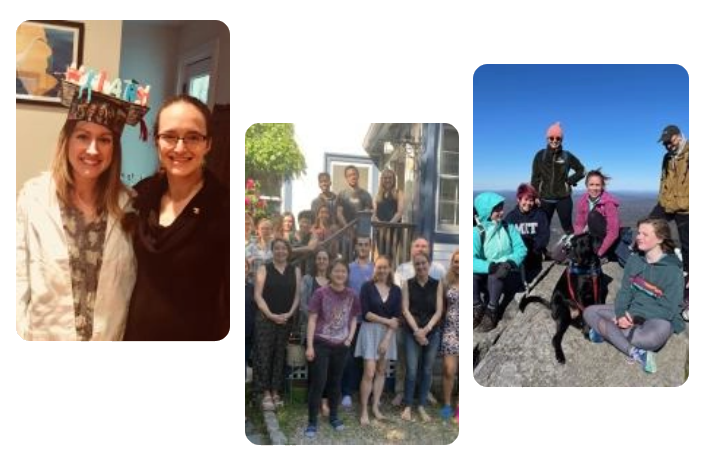Research
Recent Projects Overview
We have several projects ongoing in the lab led by our fabulous lab members. These projects cover a wide range of topics and methods.
- How taking turns communicates desired equality in social relationshipsAlicia M. Chen, Rebecca SaxeWhen people perform generous acts for each other, they can balance out relative benefits by alternating who is generous. When and why do they do this? Here we test the explanation that sequences of generosity regulate social relationships. We find that people selectively expect reciprocal generosity in equal (vs. hierarchical) relationships, use reciprocal generosity to infer the presence of an equal relationship, and critically expect that people reciprocate generosity in order to communicate …
- Predicting graded dishabituation in a rational learning model using perceptual stimulus embeddingsAnjie Cao, Gal Raz, Rebecca Saxe, Michael C. FrankHow do humans decide what to look at and when to stop looking? The Rational Action, Noisy Choice for Habituation (RANCH) model formulates looking behaviors as a rational information acquisition process. RANCH instantiates a hypothesis about the perceptual encoding process using a neural network-derived embedding space, which allows it to operate on raw images. In this paper, we show that the model not only captures key looking time patterns such as habituation and dishabituation, but also makes …
- How to Change a Mind: Adults and Children Use the Causal Structure of Theory of Mind to Intervene on Others’ BehaviorsShengyi Wu, Laura Schulz, Rebecca SaxePrior studies of Theory of Mind have primarily asked observers to predict others’ actions given their beliefs and desires, or to infer agents’ beliefs and desires given observed actions. However, if Theory of Mind is genuinely a causal theory, people should also be able to plan interventions on others’ mental states to change their behavior. The intuitive causal model of Theory of Mind predicts an asymmetry: one has to instill both the relevant belief and desire to cause an …
- Intervening on Emotions by Planning Over a Theory of MindTony Chen, Sean Dae Houlihan, Kartik Chandra, Josh Tenenbaum, Rebecca SaxeMuch of social cognition involves reasoning about others’ minds: predicting their reactions, inferring their feelings, and explaining their behavior. By representing mental contents like beliefs, desires, and emotions, Bayesian theory of mind models have made progress in capturing how humans manage these cognitive feats. But social life is not merely observation: humans must also plan to intervene on these same mental contents. The present work models how people choose interventions to …
- What people learn from punishment: joint inference of wrongness and punisher’s motivations from observation of punitive choicesRadkani, Setayesh; Saxe, RebeccaAbstract | Punishment is a cost imposed on a target, in response to an un- desirable action. Yet choosing to punish also reveals information about the authority’s own motives and values. We propose that observers jointly infer the wrongness of the action and the authority’s motivations. Using hypothetical scenarios in un- familiar societies, we experimentally manipulated observers’ prior beliefs and measured human observers’ inferences after observing punishment. These inferences were …
- Development of navigational affordance perception in infancyKamps, Frederik S.; Chen, Emily; Mah, Adele; Washburn, Stephanie; Saxe, RebeccaAbstract | Shortly after learning to crawl or walk, toddlers successfully use vision to guide navigation through the local visual space. How does this ability develop? One hypothesis is that the emergence of navigational affordance perception depends on active navigation experience (e.g., crawling). However, this hypothesis has never been tested, as almost all prior work conflates perception of navigational affordances with the integration of this information into a motor plan. Here we …
- Modeling punishment as a rational communicative social actionRadkani, Setayesh; Tenenbaum, Josh; Saxe, RebeccaAbstract | When deciding whether and how to punish, people consider not only the potential direct consequences, but also, how their choice will affect observers’ judgements about the values and motives underlying the choice. We formalize the decision to punish as a rational communicative social action (RCSA). The model generates rational decisions to punish, incorporating anticipated observers’ judgements obtained from a recursive model of inference using an intuitive theory of mind. Using this …
- Measuring language-evoked activation in the brains of awake toddlers using fMRIOlson, Halie; Chen, Emily; Saba, Somaia; Saxe, RebeccaObjective: Toddlers undergo immense changes in their language comprehension and production in a short period of time. However, compared to other age groups, we know relatively little about the neural underpinnings of language comprehension during this important developmental period, as awake toddlers are challenging to study using functional magnetic resonance imaging (fMRI). Our goal was to create a task tailored to this age group using engaging, naturalistic stimuli, as well as adapt our …
Note: that Prof Saxe is not currently planning any new projects about Autism or false belief tasks.

Get Involved
Rigorous science and strong community
We care deeply about working as a unified community, and we are welcoming anyone who wants to be a part of our research!
